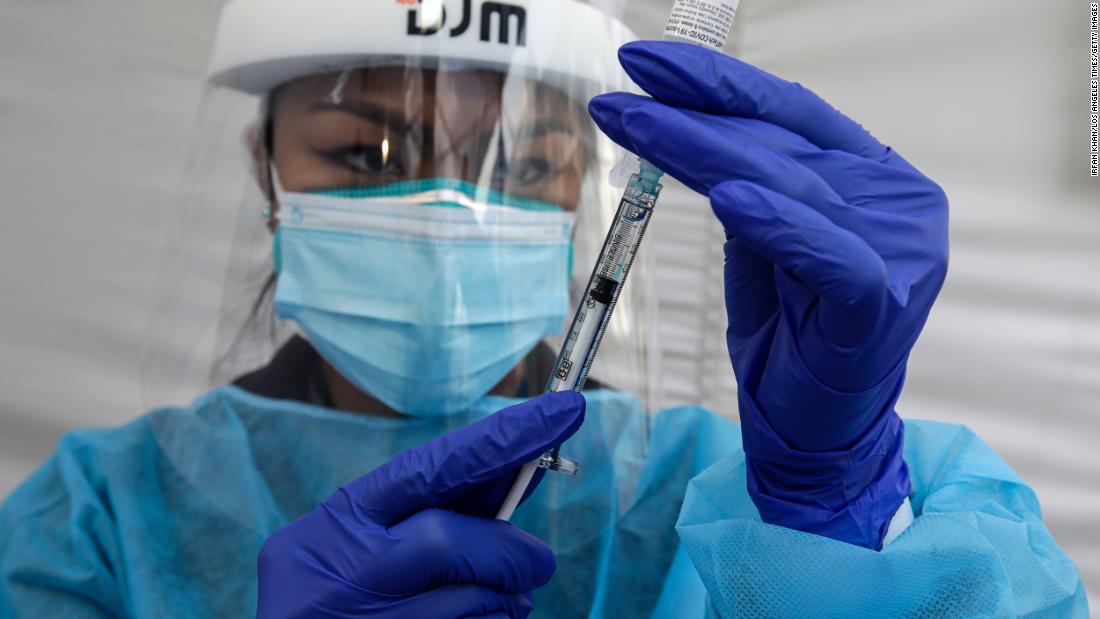City and county health departments are already running a deficit and will continue to struggle to distribute vaccines to people, said the National Association of County and City Health Officials.
“The concerns outweigh the benefits here,” NACCHO CEO Lori Tremmel Freeman told CNN.
“The money and financial support that would allow this to happen successfully is coming in after the vaccine has already been distributed – so our local health departments are already in deficit,” she added.
HHS Secretary Alex Azar framed the changes, which correspond to the approach previously announced by the new Biden government, as part of the plan all the time. A senior administration official told CNN on Tuesday that the move follows two Operation Warp Speed meetings that Azar held in the past 48 hours on how to speed up the delayed implementation process.
Vaccination of people aged 65 and over could help in areas where there have been more doses than those eligible or willing to receive them – in some cases, leading to extra doses that are not used, expire and are thrown away. And the release of second reserved doses could benefit areas where there was not enough vaccine for all those eligible and willing.
Local health officials are mobilizing to put health workers on the scene for a flurry of additional doses of the Covid-19 vaccine – but many of these departments lack staff and resources, said NACCHO’s Freeman.
“The release of all second doses and the removal of that retention are not necessarily seen as a solution to deliver the vaccine more quickly. We still have existing problems – logistical problems – about how to plan and provide staff for this mass vaccination effort, “she said.
‘There is a balance that is needed’
Both at the state and municipal levels, supply and demand are not always in line with the Covid-19 vaccine.
The two vaccines that have been authorized for emergency use in the United States – Pfizer / BioNTech and Moderna – are administered in two doses, 21 and 28 days apart, respectively.
With the Trump administration’s new distribution guidelines, Freeman said, there are concerns about exchanging messages with the public about the importance of receiving a second dose of the Covid-19 vaccine and when.
“What message will this send around the original guidance we received, that you have 21 to 28 days to receive your second dose? What if it doesn’t?” Freeman said. “A balance is needed between wanting to immunize as many people as possible and ensuring that we can successfully deliver the second doses of the vaccine and have a sufficient supply.”
Another concern at the local level is the screening of who received their first and second Covid-19 vaccine.
During Tuesday’s press conference, Azar said the second doses will still be available to those who need them.
‘We are still in the middle of the pandemic’
At the local level, some health departments may decide not to change their plans.
The city and county of Denver, for example, has administered Covid-19 vaccines under Colorado’s Phase 1a and 1b prioritization, which means that healthcare professionals, first responders and people aged 70 and over are the only groups currently eligible to receive the vaccine.
To make any changes to this phased approach, such as lowering the age of eligibility to 65, “I think it would be a statewide decision,” Dr. Judith Shlay, associate director of public health in Denver, told CNN on Tuesday. .
“Our governor would have to make that decision. I’m not sure if we’re going to do that at the moment, because we really have a lot to do with what we’re trying to do at the moment,” said Shlay.
Some states have decided to open vaccination to more people.
Idaho will open Covid-19 vaccines to all residents age 65 and older starting February 1, Governor Brad Little announced Tuesday afternoon. “We don’t want to create a bubble or wallet,” said Little. “Once we control capacity, we will be able to reach the population aged 65 and over.”
Meanwhile, in Mississippi, Governor Tate Reeves announced that Mississippi residents aged 65 and over, or those with pre-existing medical conditions, can make appointments for Covid-19 vaccinations.
But Shlay said the venture was huge.
“What we have to build is the infrastructure that can be available consistently for months on end. It will probably take nine months or a year for all of this to be implemented, ”she said.
The American Hospital Association said that simplifying the process and distributing more vaccines can help speed up vaccination.
However, “for this initiative to be successful at the speed we need, there must be a robust infrastructure in all states and jurisdictions, capable of accommodating a large volume of people receiving the first and second doses in a timely manner. way, “Rick Pollack, president and CEO of AHA, said in a statement sent to CNN on Tuesday.
‘Our local health departments have not always been at the front and center’
Speaking to CNN on Tuesday morning, Freeman said he was on his way to a meeting with President-elect Joe Biden’s transition team to discuss the launch of the Covid-19 vaccine.
She said local health departments were left out of federal decision making.
“During this pandemic, our local health departments were not always at the front and center,” she said.
“It is disheartening for us that this type of decision is made without fully integrating the public health system’s response to such a decision, especially since our health departments are under-resourced and staffed and are doing a really excellent job, despite that,” she.
“With each layer of complexity that arises, the burden on the shoulders of our health departments is becoming unbearable. They want to do a good job – they want to protect and immunize their communities and do it efficiently and effectively – but that it doesn’t necessarily help them do that. ”
CNN’s Maggie Fox, Andy Rose, Jamiel Lynch and Nick Neville contributed to this report.
